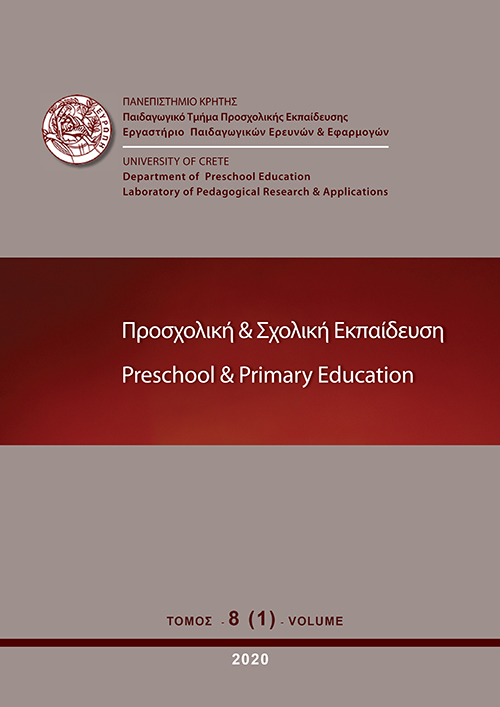Η αυτοαποτελεσματικότητα και η συλλογική αποτελεσματικότητα των δασκάλων της Κύπρου σε τάξεις συνεκπαίδευσης με μαθητές στο φάσμα του αυτισμού.
Abstract
Περίληψη
Το παρόν άρθρο εξετάζει τη συσχέτιση της αυτοαποτελεσματικότητας και της συλλογικής αποτελεσματικότητας των εκπαιδευτικών πρωτοβάθμιας εκπαίδευσης στην Κύπρο, όταν καλούνται να διδάξουν σε τάξεις συνεκπαίδευσης, στις οποίες συμπεριλαμβάνονται μαθητές που έχουν διαγνωστεί με κάποια διαταραχή στο φάσμα του αυτισμού (ΔΑΦ). Πιο συγκεκριμένα, διερευνώνται οι παράγοντες που δύνανται να επιδράσουν στα επίπεδα της αυτοαποτελεσματικότητας και της συλλογικής αποτελεσματικότητας των δασκάλων μέσα από την οπτική γωνία των ίδιων, τόσο γενικά, όσο και σε περίπτωση που διδάσκουν μαθητές με ΔΑΦ, καθώς επίσης και ο τρόπος που οι δύο αυτές μορφές αποτελεσματικότητας σχετίζονται. Στόχος είναι η διερεύνηση των παραγόντων που επιδρούν στη στάση των εκπαιδευτικών όσον αφορά το θεσμό της συνεκπαίδευσης. Στο πλαίσιο της παρούσας έρευνας πραγματοποιήθηκαν ημιδομημένες συνεντεύξεις με 13 δασκάλους και τα δεδομένα αναλύθηκαν με βάση την ποιοτική μεθόδο της θεματικής ανάλυσης περιεχομένου (content analysis). Η ανάλυση των αποτελεσμάτων προσέφερε μια επαλήθευση του θεωρητικού σχήματος των Tschannen - Moran and Hoy (2001), το οποίο βασίζεται στη θεωρία της αυτοαποτελεσματικότητας του Bandura (1977), και καταλήγει στο συμπέρασμα ότι η ενεργός συμμετοχή των μαθητών κατά τη διαδικασία της μάθησης, η δυνατότητα διαχείρισης της τάξης, και οι εκπαιδευτικές στρατηγικές που επιλέγει να χρησιμοποιήσει ο εκάστοτε εκπαιδευτικός είναι οι τρεις κατηγορίες, στις οποίες συνοψίζονται οι παράγοντες που επιδρούν στα επίπεδα της αυτοαποτελεσματικότητας του. Αναδεικνύεται, συνεπώς, η αναγκαιότητα μιας αγαστής συνεργασίας ανάμεσα σε όλους τους εμπλεκόμενους στην εφαρμογή των αρχών της συνεκπαίδευσης στα γενικά σχολεία, ούτως ώστε να επιτευχθεί η όσο το δυνατόν μεγαλύτερη μείωση των παραγόντων που επιδρούν αρνητικά στα επίπεδα αυτοαποτελεσματικότητας των δασκάλων της γενικής εκπαίδευσης. Η συμβολή της συγκεκριμένης έρευνας έγκειται στο γεγονός ότι η διερεύνηση των στοιχείων αυτών αφορά σε δασκάλους που καλούνται να διδάξουν σε μαθητές με ΔΑΦ μέσα σε τάξεις συνεκπαίδευσης, καθώς η συγκεκριμένη ομάδα μαθητών εντάσσεται τα τελευταία χρόνια στα γενικά σχολεία.
Abstract
The current article examines the relationship between perceived self-efficacy and collective efficacy among primary school teachers in Cyprus, who teach in classes that include students with autism spectrum disorder (ASD). In particular, we examine the factors that affect teachers’ self-efficacy and collective efficacy through their own perspective, both in general as well as in the case of teaching students with ASD. In addition, we study the way that these two types of effectiveness are related, with the aim of investigating the factors that affect teachers’ attitudes towards inclusion. We conducted semi-structured interviews with 13 teachers and the data were analysed via qualitative content analysis. The analysis of the results confirmed the theoretical scheme of Tschannen - Moran and Hoy (2001), based on Bandura's (1977) theory of self-efficacy. They concluded that student engagement during the lesson, classroom management and the instructional strategies that each teacher applies, are the three categories that summarize the factors that affect teachers’ perceptions of self-efficacy. Therefore, we underline the need for a genuine cooperation among all those involved in the application of the principles of inclusion in mainstream schools, so that the factors that negatively affect the levels of self-efficacy of general education teachers are reduced. The study draws timely implications concerning the practices of teachers who teach students with ASD in inclusive school settings, given that the presence of students with ASD in mainstream Cypriot schools has increased in recent years.
Article Details
- How to Cite
-
Κουλλαπή Κ., & Λύρα Ό. (2020). Η αυτοαποτελεσματικότητα και η συλλογική αποτελεσματικότητα των δασκάλων της Κύπρου σε τάξεις συνεκπαίδευσης με μαθητές στο φάσμα του αυτισμού. Preschool and Primary Education, 8(1), 31–58. https://doi.org/10.12681/ppej.21163
- Issue
- Vol. 8 No. 1 (2020)
- Section
- Articles

This work is licensed under a Creative Commons Attribution-NonCommercial-ShareAlike 4.0 International License.
Authors who publish with this journal agree to the following terms:
- Authors retain copyright and grant the journal right of first publication with the work simultaneously licensed under a Creative Commons Attribution Non-Commercial License that allows others to share the work with an acknowledgement of the work's authorship and initial publication in this journal.
- Authors are able to enter into separate, additional contractual arrangements for the non-exclusive distribution of the journal's published version of the work (e.g. post it to an institutional repository or publish it in a book), with an acknowledgement of its initial publication in this journal.
- Authors are permitted and encouraged to post their work online (preferably in institutional repositories or on their website) prior to and during the submission process, as it can lead to productive exchanges, as well as earlier and greater citation of published work (See The Effect of Open Access).



